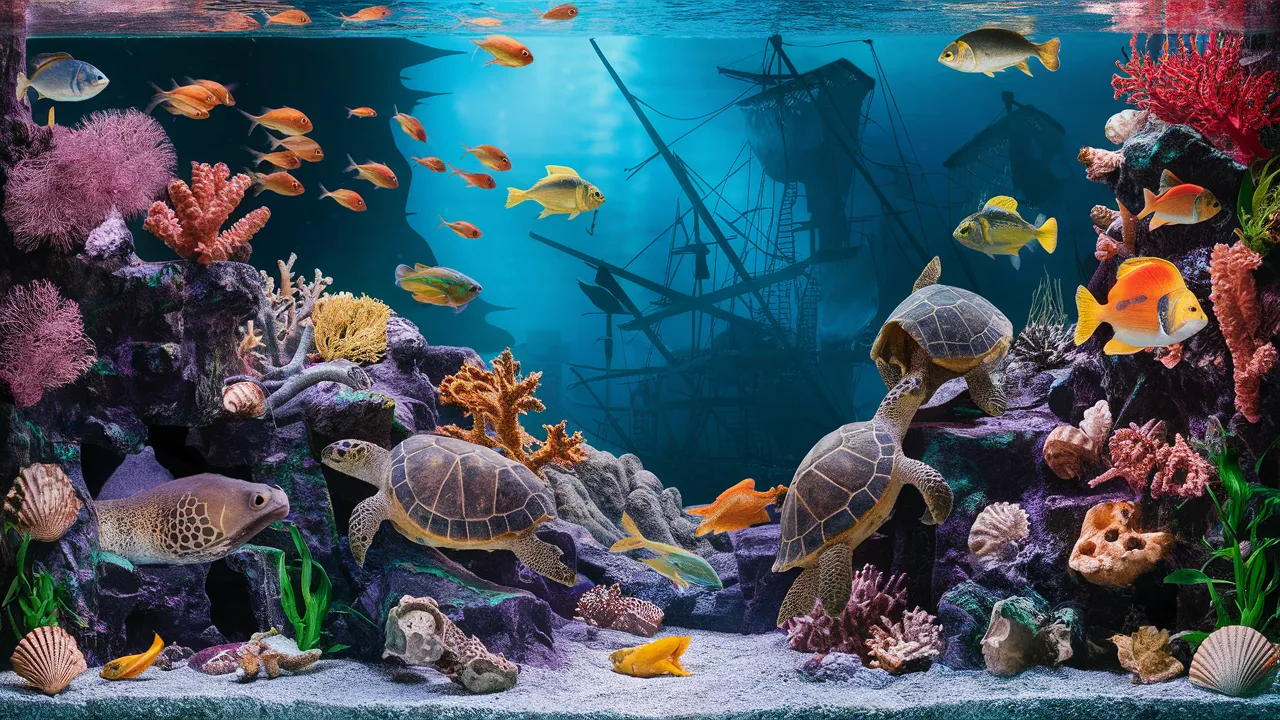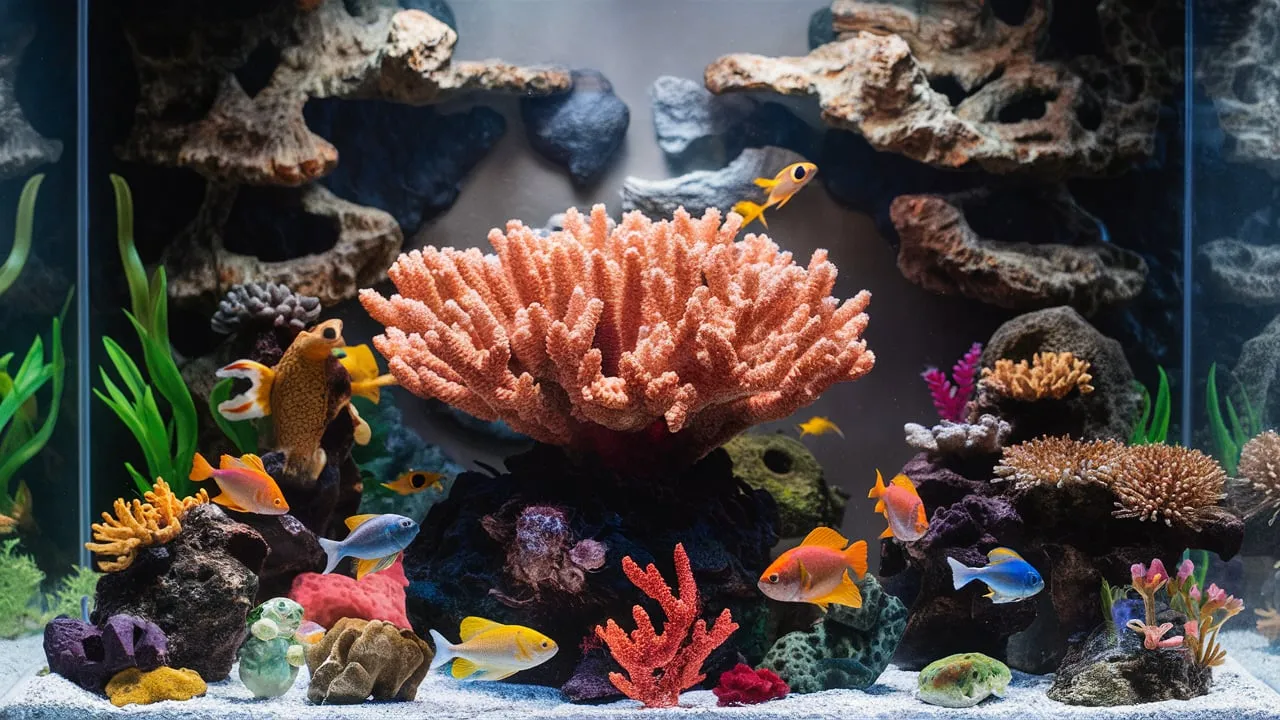What are the Things To Put In A Fish Tank? Creating a thriving underwater habitat for your fish requires careful consideration of the essential elements that contribute to their well-being.
This comprehensive Betta Fish Guide will explore the key components of a fish tank setup, covering everything from filtration and lighting to substrate and decor.
The Importance of a Well-Decorated Fish Tank
A properly decorated fish tank serves multiple purposes:
- Provides shelter and hiding spots for fish
- Creates a natural-looking environment
- Reduces stress in fish
- Enhances water quality through beneficial bacteria growth
- Offers visual appeal for human observers
Essential Equipment for Your Aquarium
Before we explore the decorative aspects, let’s start with the fundamental equipment necessary for a healthy fish tank:
Filtration System
A high-quality filtration system is the heart of any aquarium. It removes waste, excess food, and harmful chemicals, maintaining water quality and clarity. There are several types of filters to choose from:
- Hang-on-back (HOB) filters
- Canister filters
- Sponge filters
- Undergravel filters
Each type has its pros and cons, so consider factors like tank size, fish species, and maintenance requirements when making your choice.
Heater
Most tropical fish require a stable water temperature between 75-80°F (24-27°C). A reliable aquarium heater is essential for maintaining this optimal temperature range. Choose a heater with appropriate wattage for your tank size, and consider investing in a thermometer to monitor the temperature accurately.
Lighting
Proper lighting is crucial for both the visual appeal of your aquarium and the health of your aquatic plants and fish. LED lights are energy-efficient and offer a range of color options to enhance the beauty of your tank. Consider the following factors when selecting lighting:
- Light intensity
- Color spectrum
- Photoperiod (duration of light exposure)
Air Pump and Air Stone
While not always necessary, an air pump and air stone can improve oxygen levels in your tank, especially in densely stocked aquariums or those with limited surface agitation. The bubbles created by an air stone also add a visually pleasing element to your aquarium.

The Foundation of Your Aquatic Landscape
Choosing the right substrate is crucial for the overall health and appearance of your aquarium. Here are some popular options:
- Gravel
Gravel is a classic choice for many aquariums. It’s available in various colors and sizes, allowing for creative aquascaping. Opt for smooth, rounded gravel to prevent injury to bottom-dwelling fish.
- Sand
Sand provides a natural look and is ideal for fish that like to sift through the substrate. It’s especially suitable for species like Corydoras catfish and certain cichlids.
- Planted Tank Substrates
If you’re planning to keep live plants, consider specialized planted tank substrates. These nutrient-rich options provide an ideal growing medium for aquatic plants.
- Crushed Coral
For African cichlid tanks or marine aquariums, crushed coral can help maintain proper pH levels and provide a natural-looking substrate.
Bringing Your Aquarium to Life
Now, let’s explore the fun part – decorating your aquarium! Here are some popular items to consider:
Rocks and Driftwood
Natural rocks and driftwood not only enhance the aesthetic appeal of your tank but also provide hiding spots and territorial markers for your fish. Some popular options include:
- Lava rock
- Dragon stone
- Seiryu stone
- Mopani wood
Spider wood
Always ensure that any decorations you add are aquarium-safe and won’t alter your water chemistry.
Live Plants
Aquatic plants are not just beautiful; they also play a crucial role in maintaining water quality and providing a natural habitat for your fish. Some beginner-friendly options include:
- Java fern
- Anubias
- Amazon sword
- Cryptocoryne species
- Vallisneria
Live plants require proper lighting and may need additional nutrients, so research their care requirements before adding them to your tank.
Artificial Plants
If you’re not ready for the commitment of live plants, artificial plants can provide a similar aesthetic without the maintenance. Modern artificial plants are incredibly realistic and come in a wide variety of shapes and sizes.
Caves and Hideouts
Many fish species appreciate having hiding spots in their environment. You can create these using:
- Ceramic caves
- PVC pipes (properly cleaned and prepared)
- Coconut shells
- Commercially available fish hides
Background
An aquarium background can enhance the visual depth of your tank and provide a more natural-looking environment. Options include:
- Adhesive backgrounds
- Internal backgrounds
- 3D backgrounds

Selecting Fish for Your Aquarium
Choosing the right fish is crucial for creating a harmonious aquatic community. Consider the following factors:
- Tank Size
Ensure your tank is large enough to accommodate the adult size of your chosen fish species. Overcrowding can lead to stress and poor water quality.
- Compatibility
Research the temperament and social behavior of different fish species to ensure they can coexist peacefully in your aquarium.
- Water Parameters
Different fish species have specific requirements for water temperature, pH, and hardness. Choose fish that share similar water parameter preferences.
- Feeding Habits
Consider the dietary needs of your fish and ensure you can provide appropriate nutrition.
Conclusion
Creating a beautiful and healthy fish tank is a rewarding experience that requires careful planning and ongoing care. By selecting the right equipment, decorations, and fish, you can create a thriving underwater ecosystem that will bring joy and tranquility to your home. Remember to research thoroughly, be patient, and enjoy the process of building your aquatic paradise.
Whether you’re setting up a small desktop aquarium or a large community tank, the principles outlined in this guide will help you make informed decisions and create a stunning aquatic environment. Happy fish keeping!

Related Posts
Culture Of Infusoria In The Tank: A Microscopic Feast for Fry
Almond Leaf For Betta: A Natural Habitat Enhancer
Clamped Fins On Betta: Causes & Treatment